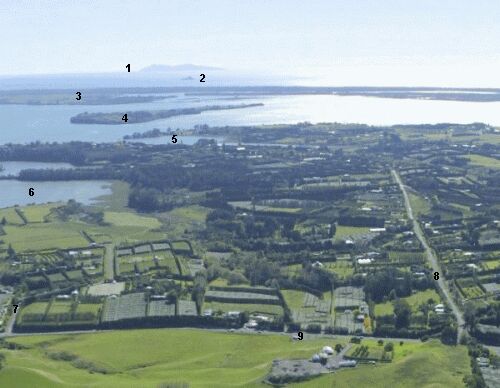

(1) Mayor Island - day long
excursions may be undertaken from Salisbury Wharf, Tauranga. The
island is a reserve and wildlife is protected. The surrounding sea
is renowned for big game fishing.
(2) Karewa Island - a
wildlife sanctuary and home of the rare tuatara lizard. Landings
are forbidden.
(3) Matakana Island - a long 24 kilomtre sandy
strip on which trees were planted to prevent erosion -these are
logged commercially. The ferry leaves from Omokorora wharf for
Opureora on the island. Not clearly visable is Rangiwaea
Island.
(4) Motohua Island - a micro-climate of it's own
growing avocado, kiwifruit and corn.
(5) Waikaraka
estuary
(6)Te Puna Estuary - a deep tidal inlet and source of
the Te Puna River
(7) Gill Lane
(8) Snodgrass Road
(9)
State Highway 2

John
Snodgrass had been born in 1814 at Scotston, Renfrewshire,
Scotland. He married Barbara Graham and with their family
emigrated to Auckland on the Jane Gifford where they settled at
Green Lane. In 1873, John leased 17 acres, the western part of the
pa site between the harbour and Levers Road and eventually
purchased this and here they built their first home, a whare.
The Otumoetai Pa formed part
of the lands confiscated by the Government after the battle of Te
Tanga. He undertook extensive cultivation and it was reported in
the Bay of Plenty Times in 1887 that he had 30 acres in maize, 12
in wheat and 10 acres in oats. He later purchased further land
south of Levers Road back to the site of the present Otumoetai
School to the end of the Levers Road peninsula and this land
remained in the possession of the family until 1941.
John Snodgrass was a dairy
farmer and became the first chairman of the Tauranga Cheese,
Butter and Bacon Manufacturing Co in 1883 located on Waihi Road.
He died in 1912 and his wife in 1914 leaving 6 sons and six
daughters.
Third son, Archibald
Snodgrass became one of the first settlers in Te Puke. He
emigrated to Rhodesia where he first ran a mail contract in
Northern Rhodesia and later a dairy farm, however the tsetse fly
devastated his herd. He returned to New Zealand where he had a
small farm at Te Puna and Snodgrass Road was named after him. He
was clerk of the racecourse at Tauranga for a number of years.
John's fourth son Alexander
named his son Alexander and he also farmed at Te Puna.
John's daughter Mary married
W H Mandeno. He acquired two properties and broke these in from
virgin land - one was later to become the Lochhead farm at Te Puna
and the other the Morton farm at Aongatete. He moved in the early
1880's to the Waikato.